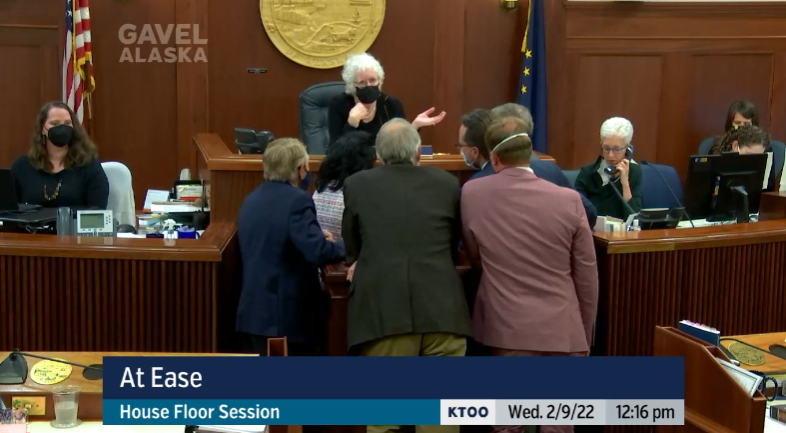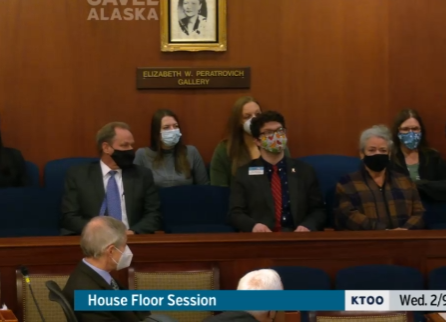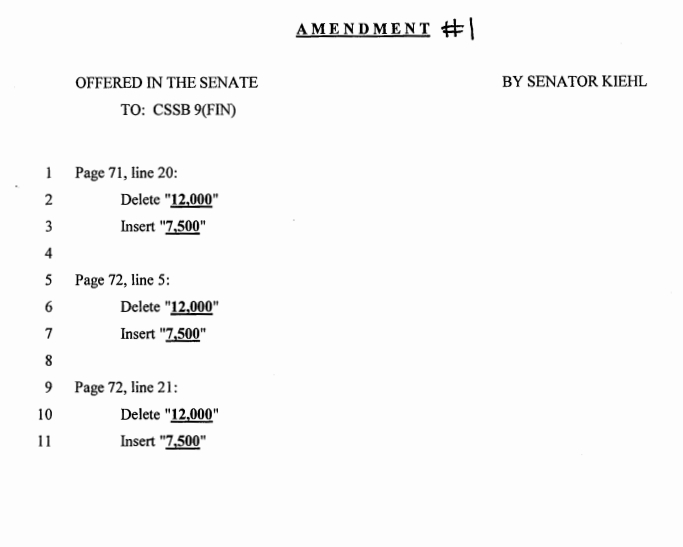
The House Military and Veterans' Affairs Committee is underway with its Oath Keepers Informational hearing. They're hosting the Anti-Defamation League's Center on Extremism and George Washington University's Program on Extremism.
#akleg
w3.akleg.gov/includes/_play…
#akleg
w3.akleg.gov/includes/_play…

Not exactly the best-attended hearing so far. None of the Republicans—who've so far voted in defense of Rep. David Eastman, a member of the Oath Keepers—are present currently.
First up is Alex Friedfeld, an investigative
researcher from the Anti-Defamation League's Center on Extremism.
He's going over the Oath Keepers' involvement in Jan. 6 and is explaining the deep state conspiracies fueling the militia movement, noting that anti-vax is a key part.

researcher from the Anti-Defamation League's Center on Extremism.
He's going over the Oath Keepers' involvement in Jan. 6 and is explaining the deep state conspiracies fueling the militia movement, noting that anti-vax is a key part.


Friedfeld says Oath Keepers are not inherently white supremacist organizations, but they sure have some streaks of it. He says it can be a useful motivator but not their organizing principle.
Noting white supremacist groups are freq. overtly anti-government, anti-constitution.
Noting white supremacist groups are freq. overtly anti-government, anti-constitution.
He's explaining how fringe militias grab onto real-world events like USSR collapse, NATO, United Nations, gun control legislation, Waco, the election of Barack Obama, fiscal crisis and social media have helped fuel the conspiratorial attitudes and recruit new members.
Friedfeld says the Obama era saw the rise of the three percenter concept, which was this idea that only 3% of the colonists rose up against Britain and it's thanks to that independence was secured.
Eastman was once a member of a III%er Facebook group, btw.
Eastman was once a member of a III%er Facebook group, btw.
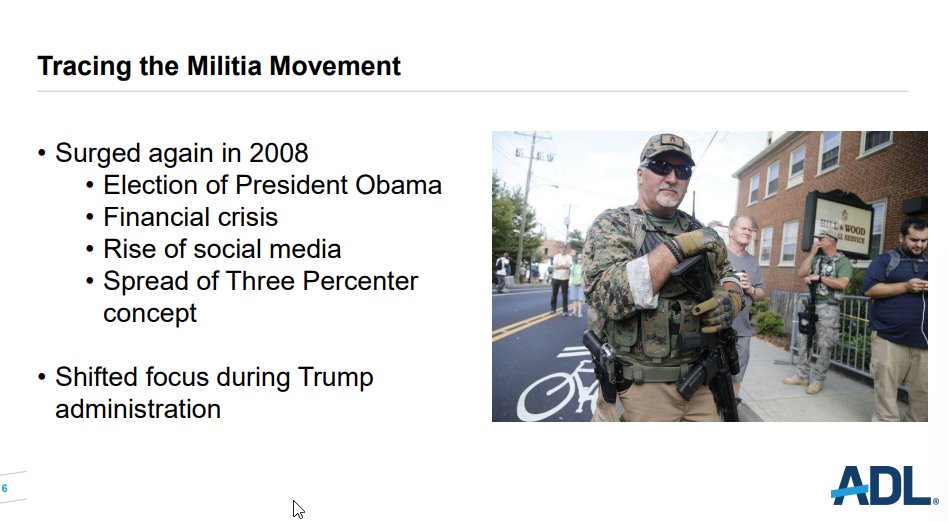
Then Trump got elected, Friedfeld notes, and all the sudden the Oath Keepers & other militias were fine with the federal government. They got all angsty and violent against local and state governments over covid mandates.
Covid conspiracy is, of course, big part of it.
Covid conspiracy is, of course, big part of it.
Friedfeld says that the big problem is the militia movement and conspiracy thinking creates this idea that the normal avenues of change are no longer possible:
"And the idea of using violence starts to seem more reasonable."
"And the idea of using violence starts to seem more reasonable."

He notes the Wolverine Watchmen, the group that plotted to kidnap and murder Gov. Gretchin Whitmer. He says it's an important example to understand how militia conspiracies "can poison their minds."
Update on committee attendance. I believe that's all the Democrats who are in attendance while the committee's three Republicans: Reps. Rauscher, Shaw and Nelson are not. 

Now onto the Oath Keepers. Friedfeld talks about how it's the largest group and that it's specifically targeted military members, police and first responders.
It's trying to condition them to reject whatever orders the Oath Keepers group believes is unconstitutional.
It's trying to condition them to reject whatever orders the Oath Keepers group believes is unconstitutional.
Friedfeld says the problem with the Oath Keepers' membership among armed services is troubling because it undermines public trust in the institutes. The public has the right to trust that their military and police are not following some secret, conspiratorial militia thinking.
Friedfeld also notes that "the training these people receive makes them unique dangers in the event they ever do decide to act. They are trained in skills that were taught to be used in one setting" and then used on Jan. 6.
Earlier he had pointed out how the Oath Keepers can be spotted with the hands on shoulders, a bit of military/militia training. 

He also points out how they are following old-school militia New World Order conspiracies. Their view of what is and isn't constitutional is warped. 


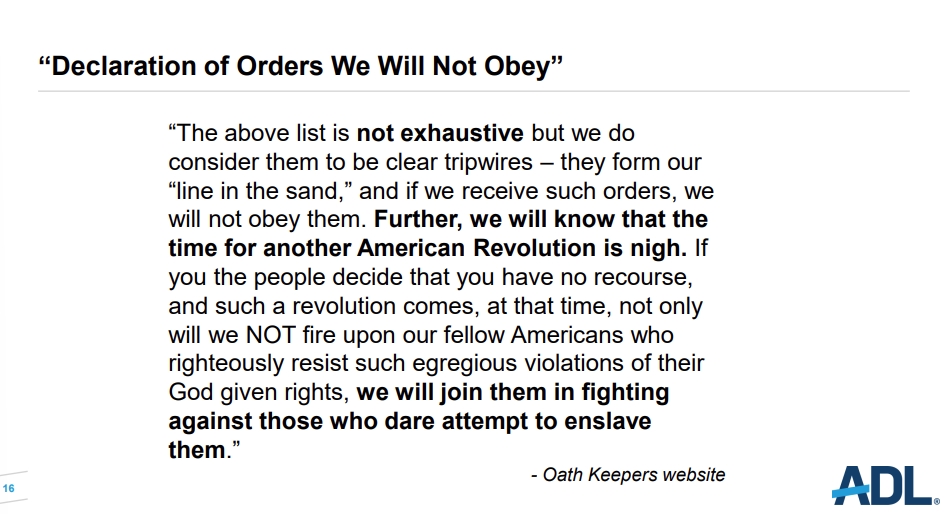
He also notes that they wrap themselves in patriotism as means to shield their group from criticism (something we've seen already in the Legislature).
"However what they're actually doing is using patriotism to their own end."
"However what they're actually doing is using patriotism to their own end."

The problem with it all, he says, is that the Oath Keepers view themselves as "the arbiters of what's constitutional."
"They swear their oath to the constitution, but it's a warped version of that. They're trying to create this image that they're the defenders and protectors."
"They swear their oath to the constitution, but it's a warped version of that. They're trying to create this image that they're the defenders and protectors."
He also noted that the Oath Keepers swear an oath to the Constitution, but "They're trying to leech that legitimacy to themselves." They're arguing that it's actually the federal government that's not following the constitution.
Friedfeld: "It's not that they have their own oath, they're swearing an oath to the constitution but with caveats."
He also notes that they ignore a key part of the military oath of enlistment. And leave out the apart that's highlighted:
He also notes that they ignore a key part of the military oath of enlistment. And leave out the apart that's highlighted:

Now the Legislators are getting confused about what the precise oath that the Oath Keepers are taking.
Some of it is part of the bylaws but it's not part of the literal oath.
Rep. Story: "I'm confused still"
Some of it is part of the bylaws but it's not part of the literal oath.
Rep. Story: "I'm confused still"
Friedfeld says they take the Oath of Enlistment with the emphasis being on the defending the constitution (a warped idea of the constitution) with the plank of the Top 10 Orders We Will Not Obey: 



Rep. Tuck: What does the oath say?
Friedfeld notes the name Oath Keepers is kind of misleading. You don't have to actually swear an oath to anything, he says. But the whole myth-building is that they've sworn an oath to the Constitution (again, a warped idea of the constitution)
Friedfeld notes the name Oath Keepers is kind of misleading. You don't have to actually swear an oath to anything, he says. But the whole myth-building is that they've sworn an oath to the Constitution (again, a warped idea of the constitution)
If they really wanted to get a good idea of it, they ought to ask Rep. David Eastman, who's an actual Oath Keeper.
And we get into the whole Oath Keepers draping themselves in patriotism and various Oath Keepers in the headlines: 

And then there was various Oath Keepers in the news, including the armed standoffs with the Bundys. He's talking about how some of the involvement included being paranoid about domestic drone strikes. 

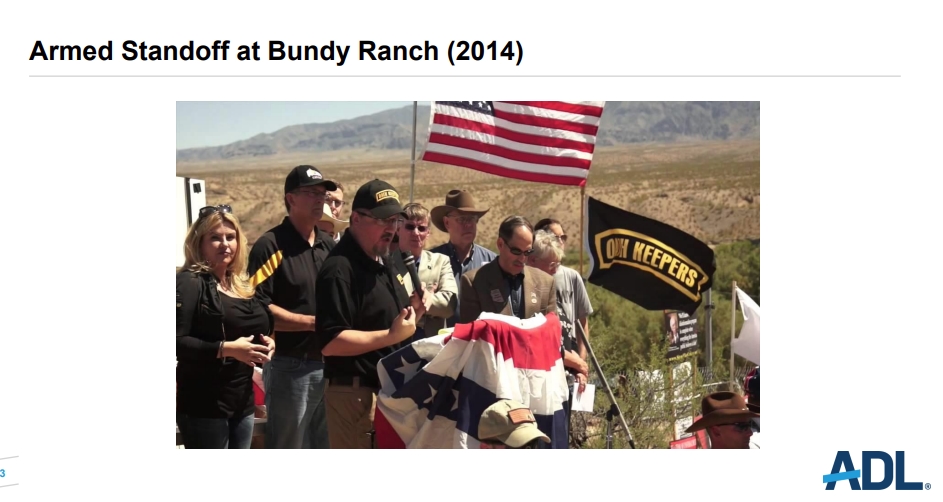

And how about that whole "We're just against the federal government wand would never take up arms against fellow Americans" thing?
They took up arms at Ferguson.
Friedfeld notes many are just playing soldier with no training and no familiarity, referencing Kenosha.
They took up arms at Ferguson.
Friedfeld notes many are just playing soldier with no training and no familiarity, referencing Kenosha.
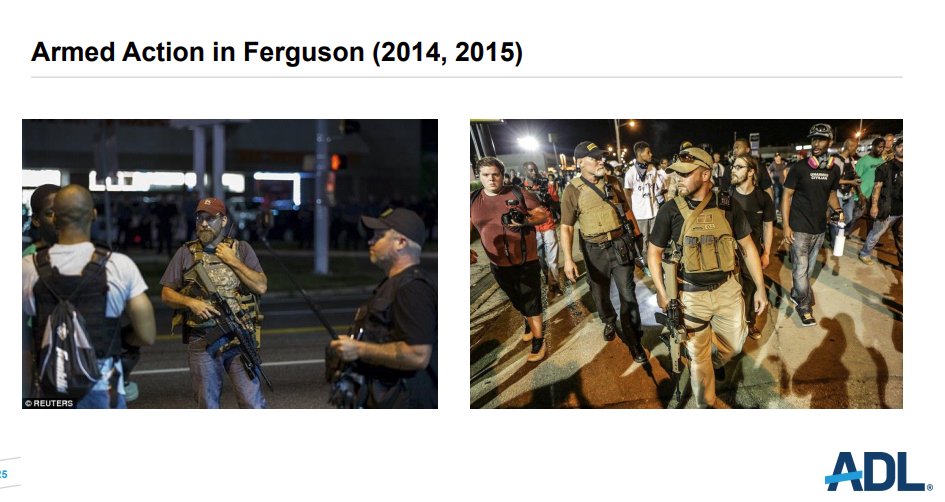
Friedfeld: "The problem is they usually came armed with their guns and biases."
Rep. Tarr has several questions about Bundy and Quarzite: "I just want to understand how they came to think these were actions that needed to be challenged."
Friedfeld says that's the problem. They view things as unconstitutional when they're not.
Friedfeld says that's the problem. They view things as unconstitutional when they're not.
Friedfeld~ It's important to differentiate between the (Oath Keeper) rhetoric about what is constitutional and the reality, and understand that they're using the rhetoric of constitutionality to justify their beliefs, which are warped by conspiracy.
Then Tarr gives some lengthy talk about non-violent protest, saying protest is an important piece of civil discourse. She asks if they ever do it without guns.
Friedfeld says sometimes, but mostly with guns.
Friedfeld says sometimes, but mostly with guns.
Friedfeld: "They like to come kitted up to clash."
Friedfeld says that 2020 was a big year of escalation for the Oath Keepers, seeing an escalation in rhetoric and violent threats. Says they offered to come armed in protest to covid mandates and the Black Lives Matter protests. 

And then the sudden moment where the Oath Keepers militia group was openly calling on Trump to use military forces to attack leftist groups.
Friedfeld says this was unthinkable change from just a few years ago.
Friedfeld says this was unthinkable change from just a few years ago.
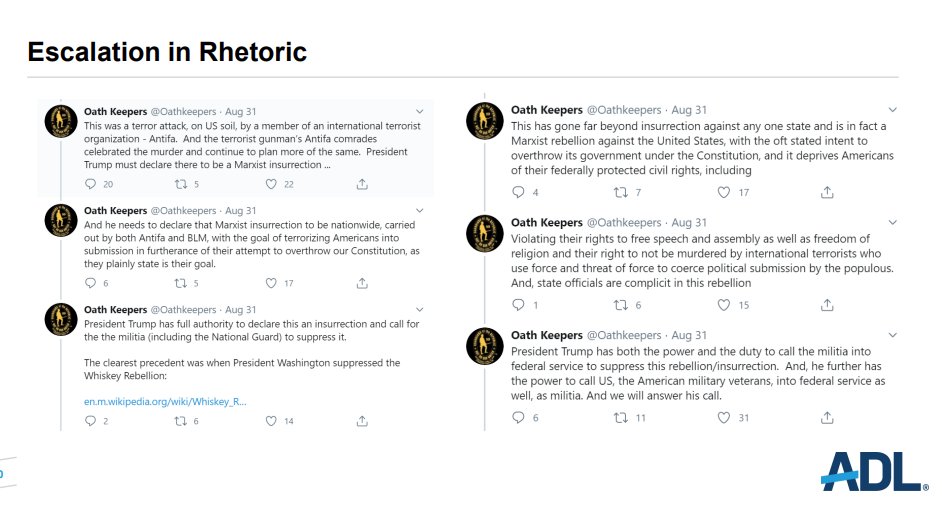
And in late 2020 there were several calls to violence, calling for Trump to invoke the insurrection act against leftist groups and activate the military. 





And now into Jan. 6. They talk about how the Oath Keepers were key instigators during the insurrection with columns of kitted-up militia groups that helped enter the capitol.
Notes the stashing of weapons nearby.



Notes the stashing of weapons nearby.




And then in the aftermath, they haven't slowed. Continued with their rhetoric that Biden is "a Chinese puppet." 

Rep. Story asks whether all the Oath Keepers were participating in Jan. 6.
Friedfeld says no, not everyone was there.
Story asks if there's been factions since then. Have people backed off? Friedfeld says not in a significant number.
Friedfeld says no, not everyone was there.
Story asks if there's been factions since then. Have people backed off? Friedfeld says not in a significant number.
Friedfeld says that's part of the problem with the group. It's intentionally a loose organization. Some people who were turned off might just have logged off and stopped participating.
Friedfeld says that there's been many reactions ranging from arguing that it was "legitimate political discourse" to continued claims that was all a bunch of BLM, antifa instigators. (Which is what Rep. Kurka said yesterday, claiming it was only "crazy nuts" and FBI agents)
Rep. Tarr asks if there's anything that works to make people believe that the elections aren't stolen.
Friedfeld says not really, their whole world view is based on deep state, new world order conspiracies.
Friedfeld says not really, their whole world view is based on deep state, new world order conspiracies.
Rep. Story asks if Oath Keepers feel bad about it.
Friedfeld says not really. He was monitoring a lot of their chats on the day of the event. He says the closest thing you get to regret is them just blaming BLM and antifa.
Friedfeld says not really. He was monitoring a lot of their chats on the day of the event. He says the closest thing you get to regret is them just blaming BLM and antifa.
Friedfeld: "Rather than large-scale denunciation, they try to spin it into more conspiracy. ... They've since leaned into that messaging. It doesn't come to mind in anyone that says this isn't us and this isn't what we're about."
Oath Keepers have either doubled down on events of Jan. 6 or launched conspiracies about it, he says.
Rep. Tuck says they tried to reach out to Oath Keepers to get their input on the hearing. Says the national group never responded but state branches in Virginia and Philadelphia have distanced themselves from the national group and its now-indicted leader.
By the way, you can find the presentations here: akleg.gov/basis/Meeting/…
Now up is Jon Lewis, a researcher at the Program on Extremism at The George Washington University.
He authored this report on the role of the Oath Keepers in Jan. 6 attack on the U.S. Capitol: akleg.gov/basis/get_docu…
He authored this report on the role of the Oath Keepers in Jan. 6 attack on the U.S. Capitol: akleg.gov/basis/get_docu…
It doesn't look like the slides of Mr. Lewis' presentation is online but here's the latest data on the folks who've been charged for activities on Jan. 6: 

Lewis talks about how a lot of people openly broadcast their actions, making them low-hanging fruit for prosecution: "They in many cases didn't think there would be consequences for their actions because they thought they were well and truly on the right side of history."
Lewis talks about six types of defendants. One of them includes friends and family who were basically rides. Others were individuals who spontaneously decided to go into the capitol. Were there for the protest and had a little insurrection, as a treat. 

Lewis notes that some of those spontaneous individuals also happened to participate in some spontaneous violence, which he describes as "medieval" like bludgeoning police officers with whatever they could find and bear spray, etc.
Lewis notes that some of the most troubling incidents are the involvement of organized militia groups, the ones that led the breaching of the U.S. Capitol through Stack 1 and Stack 2.
Those would be the arms on the shoulder guys from the earlier presentation.

Those would be the arms on the shoulder guys from the earlier presentation.


And we get a reminder from Lewis that the cases against the Oath Keepers is far more serious and complex than what most of the tourist types—who've gotten off relatively light—and that they're going to take time to reach a conclusion.
Innocent until proven guilty.
Innocent until proven guilty.

But then we go over a whole bunch of internal Oath Keepers communications that sure looks like they were ready for violence on Jan. 6.
Rep. Story asks if everyone would've got it.
Lewis says it was a significant number, but not everyone.
Rep. Story asks if everyone would've got it.
Lewis says it was a significant number, but not everyone.
Is this all the indictments or will there be more?
Lewis talks about how there are some specific individuals outlined in documents who have not yet been charged.
Lewis talks about how there are some specific individuals outlined in documents who have not yet been charged.
Continuing on, Lewis walks through the charges with reconnaissance missions, unconventional military training and other military tactics going on behind the scenes.
Lewis stresses that there's a major difference between the Oath Keepers' public-facing claims (that they're patriots upholding the constitution) and what they're doing behind the scenes (increasing militarization and planning)
Then there's some internal communications of the Oath Keepers that were specifically talking about efforts to intimidate Congress into stealing the election for Trump. And then they went onto buy a bunch of guns.
A lot of talk about the Oath Keepers' "Quick Reaction Force" that was staged at a Comfort Inn in Arlington Virginia. There's a slide with security camera footage of them trundling the guns into the staging. 

We're getting more tick-tock explanation of the events of Jan. 6 and the Oath Keepers' activities where they were organizing and coordinating between their capitol combatants and their quick response forces.
Eastman, on the night of Jan. 6. Perhaps he was part of the Oath Keepers' little-known Slurp Team Six. 

While Eastman was sucking down a slurpee, the diehard Oath Keepers were apparently celebrating at an Olive Garden and planning additional events.
Lewis says it's important to note that the indictment of the leaders hasn't stopped the movement: "It's not the death of an ideology."
This is a way more interesting and useful hearing than I was expecting, honestly. I had only known some of the vague outlines of the Jan. 6 stuff, but this paints a key distinction between some of the Jan. 6 spontaneous folks and the real deal threat posed by the militia groups.
Rep. Tuck asks if there's been documented cases about military members refusing to follow orders because of Oath Keeper membership.
Lewis says it's not clear. Says it likely wouldn't be publicized by the military.
Lewis says it's not clear. Says it likely wouldn't be publicized by the military.
The committee will host another meeting the Oath Keepers on Feb. 15.
They'll have Sam Jackson, the author of "Oath Keepers: Patriotism and the Edge of Violence in a Right-Wing Antigovernment Group"
And Matthew Kriner, another investigator of the far-right.
They'll have Sam Jackson, the author of "Oath Keepers: Patriotism and the Edge of Violence in a Right-Wing Antigovernment Group"
And Matthew Kriner, another investigator of the far-right.
Rep. Tuck: "I also want to remind everybody that we are actively trying to find someone with Oath Keepers to be able to present in front of the committee to be able to tell their story. At this time, we haven't been able to find anyone."
Says he's open to suggestions.
Says he's open to suggestions.
That's it for this hearing.
They'll be back on Feb. 15 (which is also redistricting decision day!) with more.
They'll be back on Feb. 15 (which is also redistricting decision day!) with more.
• • •
Missing some Tweet in this thread? You can try to
force a refresh






